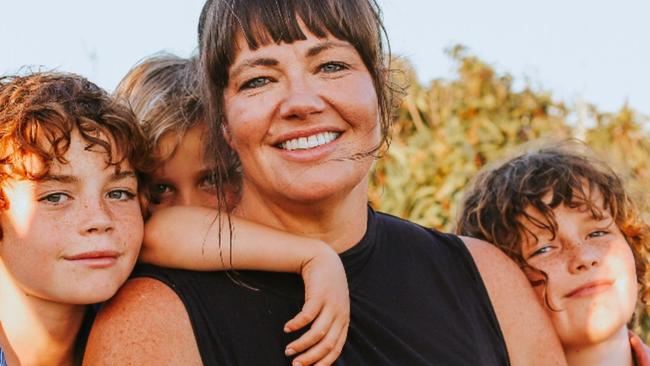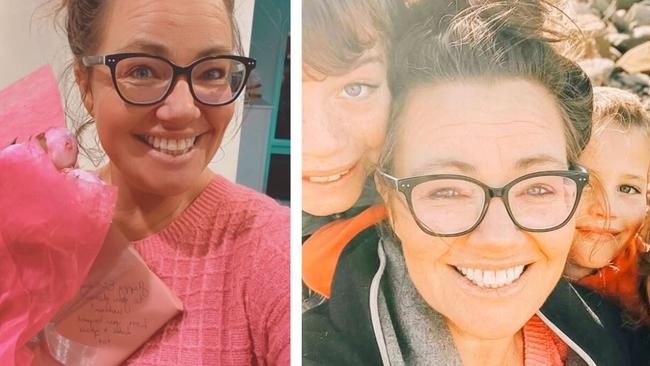I would end up screaming at him, ‘You have to go to school!’
"I’m supposed to have a good kid, and it’s my fault." An Aussie mum shares how she overcame school battles.
Parenting
Don't miss out on the headlines from Parenting. Followed categories will be added to My News.
When Alita Blanchard’s son teared up at school drop-off, and made his way back to the car saying he couldn’t walk in, she felt sad but mostly… inconvenienced.
“The voice in my head was saying ‘he is being defiant; he’s ruining my day… I would end up screaming ‘you have to go to school’,” she shares with Kidspot.
When he came home saying he got in trouble at school, or had an aggressive meltdown, the NSW holistic counsellor would “flip her lid”.
“It triggered shame in me. That feeling of, ‘oh I’m supposed to have a good kid, and it’s my fault’.”
Want to join the family? Sign up to our Kidspot newsletter for more stories like this
After sending three boys to primary school, Alita has come out the other side a different mum and wishes she did things differently when her first packed his bag for Kindy.
As millions of mums gear up for another school year, with worries how their kids will cope and behave, the parent coach has some advice – and it’s not for the kids – it’s for us.
Alita's 9 tips for surviving parenting
Mums need to work on their nervous system first
“My biggest regret is not working on my nervous system regulation sooner,” Alita says.
During a deep state of grief after the stillbirth of her fourth son, Alita fell into a depression and dysregulation at the same time as her son’s ‘challenging behaviour’ at school.
“There was anxiety, neurodivergence, and layers of bullying I didn’t know the extent of, and I was an aware parent. But I didn’t have the emotional capacity to regulate and hold what was coming up for him.”
New school parents must recognise how their stress might impact their child. Alita suggests mums lean into breathwork, mindfulness and micro moments of self-care, because “you have to be emotionally well to support your kid."
“Kindy is a huge transition, they will mess up, yell, and say mean words. There will be days they won’t want to go. You must surrender, and support is crucial.
“You need someone to talk to, a friend, a therapist. We have to invest in ourselves, otherwise we can’t cope.”

RELATED: ‘My son’s parent-teacher interview had me in tears’
Let the tears and meltdowns happen
Meltdowns at school pick up are common, and parents need to listen. If you don’t have the emotional capacity, offer food, fun or music.
“Tears are healing. Big emotions are normal in this transition. Hold space for them without shame or punishment,” Alita says.
While the ‘after school restraint collapse’ is common, it is not normal and shouldn’t be long-lasting.
“Most kids tuck their feelings deep inside and hold on to tears when they’re upset or shamed at school and it comes out at home,” she says. “Prioritise one-on-one time. Play and special moments help move big feelings.”
If bedtime on school nights becomes difficult, use the opportunity to work on your own regulation. “Put on a meditation, snuggle and listen,” she says. “20 years down the track, you’ll never regret slowing down and being present with them.”
Don’t ask your kids too many questions
“I asked way too many questions,” Alita admits. “They’d get in the car, and it would start – ‘who did you play with? Why did you do that?’, it’s the last thing they want; to be at school all day and get home and talk about school.”
Instead, give them a tight cuddle, and say ‘I’ve missed you, it’s good to be back together’.

Bring snacks to pick up
Alita warns that children, especially sensitive kids, can have blood sugar crashes turning their behaviour “feral”.
Bring an icy cold drink, smoothie or snack to pick up. Protein or crunchy, sweet and sensory snacks are best. It fills their belly and is a moment of connection.
Offer a calm environment, and lots of play
After school, your child will need a quiet, and slow environment, after a busy day surrounded by a lot of stimulation and people. And then play. It is a child’s most important work.
“I’m not a big believer in screens for emotional regulation, but if that’s all you have capacity for – offer low stimulation TV, before connected playtime,” she says.
“Do not plan a shopping trip after school, go climb a tree, go to the park.
“Give lots of big squeezy hugs and rough and tumble games… I still tackle my teenagers to the ground. It’s a moment of connection and play even if it’s 10 seconds.”
Don’t overload the schedule
Alita warns Kindy children will be knackered after school, so don’t fill up every afternoon.
“Overcomplicating schedules and routines can increase stress for both you and your child,” she says. “After school activities should be minimal. Allow time for rest, play and connection.”
Introducing our new podcast: Mum Club! Listen and subscribe wherever you get your podcasts so you never miss an episode.
Make friends with school mums
A regret Alita has is not making friends at the start of her school experience. It can feel vulnerable putting yourself out there, but it’s worth it.
“I found school easier when I had social connections,” she says. “Try and make one or two good mum friends. You need at least one safe family to connect with. Hold them and let them hold you through the hard stuff.”
Take mental health days, and push back on homework
If Alita had a child in Kindy, she would take a controversial stance on attendance.
“If you can get away it, take days off. It depends on your school. But if I had my time again, I would take every Friday off, and go into nature,” she says.
“My biggest regret is pushing my kids on days when the anxiety was intense. I didn’t realise it was anxiety and fear, I thought they were being difficult.”
It’s Alita’s views if a child is happy, the learning will come. “You can opt out of homework, and rewards. A child can’t thrive academically if they are not emotionally well.”
If a child is struggling, work with the school
If your child is having a hard time (bullying, overwhelm, meltdowns) meet with the school.
“If the school calls, ask what they recommend. Have a meeting. Get them on board,” Alita says. “Find support, look under the aggressions. It might mean therapists, medication, changing schools, or just offering more downtime.
“If your child is struggling, it’s not your fault, but it is your responsibility to get help.”
Maggie Dent's tips for Kindy kids
Parenting author, educator and mum of four boys, Maggie Dent, also champions the importance of supporting a child’s emotional needs as they enter kindergarten.
In Australia there has been a massive ‘push down’ of formalised learning where what was normal for a six-year-old now happens at five, she says.
Her four (now grown) sons experienced half days in Kindy, which were spent “mostly outside in a sandpit” and playground. Today there is an increased pressure for five-year-old’s to be ‘hurried up’ which has seen “a reduction in play-based learning and a lessening of movement”, a key essential for kids to help them self-regulate.
“Recess and lunch time are incredibly important at refilling their energy cups,” Maggie says.
- Don’t ‘over sell’ school like it’s going to be exciting, and they are going to love it
- Don’t have many expectations on school mornings. Get up, eat, get dressed and remind them about teeth. Leave the bed and toys, too much extra stress.
- Having a good friend ASAP is critical in the success of transition
- Walking to school or having playtime before class can help them prepare for the challenge of the classroom
- Talk about plans for weekend as much as possible so he has something to look forward to beyond the school gate.
Alita Blanchard is offering a new program for mums, Mother Grow focused on emotional regulation, self-compassion and connection.
Maggie’s podcast Parental As Anything has just launched a Back to School mini-series for more advice.
More Coverage
Originally published as I would end up screaming at him, ‘You have to go to school!’





